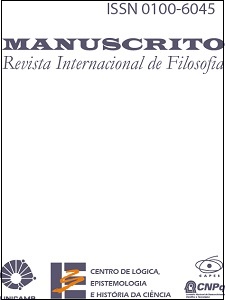Resumen
En este artículo considero los argumentos que Merricks (1995) presenta para probar la incompatibilidad de ciertas concepciones del tiempo respecto de ciertas tesis ontológicas. Merricks sostiene que (i) el presentismo implica que no hay objetos tetradimensionales y que (ii) el indexicalismo implica que no hay continuantes. De (i) y (ii) concluye que (iii) no pueden existir a la vez continuantes y objetos tetradimensionales, contra la posición aristotélica más tradicional. Mi objetivo en este trabajo es mostrar que los vínculos que Merricks señala entre presentismo y teoría de los continuantes, por un lado, y entre indexicalismo y tetradimensionalismo, por otro, no están bien fundamentados, de modo que (iii) no está bien justificada. Las razones para rechazar (i) y (ii) dependen principalmente de dos elementos: que el autor parece confundir presentismo con dinamismo y que ofrece una idea errada del adverbialismo, una opción indexicalista para el partidario de continuantes. Formularé también algunas observaciones contra el dinamismo, aunque no entraré a fondo en el debate entre presentismo o indexicalismo.Citas
BORDES, M. (1997). “Consideraciones procesualistas: en defensa de las partes temporales”, Theoria, 12/2, pp. 343-377.
CHISHOLM, R. (1976). Person and Object (Londres, George Allen and Unwin LTD).
CRANE, T. (1995). “Time”, en Grayling, A. C., ed. (1995), Philosophy. A Guide through the Subject (Oxford, Oxford University Press).
DUMMETT, M. (1960). “A Defense of McTaggart’s Proof of the Unreality of Time”, The Philosophical Review, 69, pp. 497-504.
HASLANGER, S. (1989). “Endurance and Temporary Intrinsics”, Analysis, 59, pp. 119-125.
HELLER, M. (1992). “Things Change”, Philosophy and Phenomenological Research, 52, 3, pp. 695-704.
Le POIDEVIN, R. y MacBEATH, M., (eds.) (1993). The Philosophy of Time (Oxford).
LEWIS, D. (1986). On the Plurality of Worlds (Oxford, Basil Blackwell).
McTAGGART, J.M.E. (1908). “The Unreality of Time”, In: LePOIDEVIN et al. ((1993), pp. 23-34) MELLOR, D.H. (1981). Real Time (Cambridge, Cambridge University Press). MERRICKS, T. (1994). “Endurance and Indiscernibility”, Journal of Philosophy, XCI, 4, pp. 165-184.
———. (1995). “On The Incompatibility of Enduring and Perduring Entities”, Mind, 104, pp. 523-531.
OAKLANDER, L.N. y SMITH, Q., (eds.) (1994). The New Theory of Time (Londres, Yale University Press).
OAKLANDER, L.N. (1992). “Temporal Passage and Temporal Parts”, Nous, 26, pp. 79-84.
PERRY, J.(1977). “Frege on Demonstratives”, Philosophical Review, 86, pp. 474-497.
PRIOR, A. N. (1959). “Thank Goodness That´s Over”, Philosophy, 34, pp. 12-17.
SCHLESINGER, G. (1975). “Similarities Between Space and Time”, Mind, 84, pp. 161-176.
SMART, J. J. C. (1955). “Spatializing Time”, Mind, 64, pp. 239-241.
SPRIGGE, T. L. S. (1992). “The Unreality of Time”, en Proceedings of the Aristotelian Society, 92, 1, pp. 1-19.
TAYLOR, R. (1955). “Spatial and Temporal Analogies and the Concept of Identity”, The Journal of Philosophy, 52, 22, pp. 599-612.
WILLIAMS, D. C. (1951). “The Myth of Passage”, The Journal of Philosophy, 48, 15, pp. 457-472.

